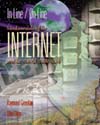 |  Inline/Online: Fundamentals of the Internet and the World Wide Web, 2/e Raymond Greenlaw,
Armstrong Atlantic State University
Ellen Hepp,
The University of New Hampshire
Searching the World Wide Web
Chapter 5 Key TermsThis glossary contains a list of important terms used in the text. Both the terms and their meanings are presented. This list is not intended to be exhaustive. For example, many of the HTML concepts are not included, but can easily be traced through the index.
| all-in-one search engine | See metasearch engine.
|  |  |  | | Boolean query | Queries that involve the Boolean operations AND, OR, and NOT.
(See 214, 220, 632)
|  |  |  | | eXtensible Markup Language (XML) | A Web page design language that will support user-defined tags.
(See 203, 417, 613, 636)
|  |  |  | | hit | A URL that a search engine returns in response to a query. Match
is a synonym.
(See 177, 212, 226, 638)
|  |  |  | | metasearch engine or all-in-one search engine | A search tool that calls on more than one other search engine to do the actual searching.
(See 204-206, 641)
|  |  |  | | pattern matching query | A query formulated using a keyword or a group of keywords.
(See 212-214, 220, 643)
|  |  |  | | query | Information entered into a form on a Web page, describing the
topic on which information is sought. A query is usually not phrased as a question.
(See 212-216, 644)
|  |  |  | | query semantics | A set of rules that defines the meaning of a query.
(See 212, 644)
|  |  |  | | query syntax | A set of rules describing what constitutes a legal query. On some search engines, special symbols may be used in a query.
(See 212, 220, 644)
|  |  |  | | relevancy score | A value that indicates the closeness with which a URL matches a query. It is usually expressed as a value from 1 to 100, with the higher score meaning more relevant.
(See 212, 226-227, 645)
|  |  |  | | search engine | A search tool that allows a user to enter queries. The program responds with a list of matches from its database. A relevancy
score for each match and a clickable URL are usually returned.
(See 200-206, 461, 646)
|  |  |  | | stemming | The process a search tool uses to add variations to the endings of words you query on, to turn up more hits.
(See 214, 647)
|  |  |  | | Web directory | A hierarchical representation of hyperlinks to Web presentations
that are organized into categories.
(See 191, 650)
|  |  |  | | white pages | A database that serves as an on-line telephone book.
(See 12, 206-207, 650)
|  |  |  | | worm | A stand-alone program that tries to gain access to computer systems via networks.
(See 227, 651)
|
|



 2002 McGraw-Hill Higher Education
2002 McGraw-Hill Higher Education